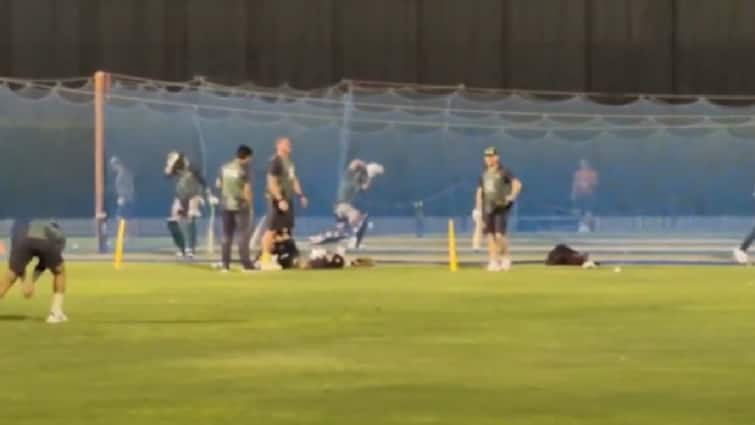The cricket world is bracing for one of the most electrifying showdowns of the year: the Asia Cup 2025 final between India and Pakistan, set for Sunday, September 28, at the Dubai International Stadium. This high-octane encounter marks the third meeting between the subcontinental arch-rivals in this tournament, promising drama, intensity, and cricket at its finest.
But in the buildup to the blockbuster clash, Pakistan faced a worrying moment. During a practice session, wicketkeeper Mohammad Haris was struck in the lower abdomen by a delivery from Wasim Jr, leaving him in visible discomfort. The incident, captured on video and widely shared on social media, highlighted the physical toll and high stakes these players endure in preparation for such a critical match.
VIDEO | Pakistan wicketkeeper Mohammad Haris seen in serious discomfort after being hit in the lower abdomen by Wasim Jr during the practice session ahead of Asia Cup final against India on Sunday.
(Full video available on PTI Videos – https://t.co/n147TvrpG7)#AsiaCup2025 pic.twitter.com/GHGSb2ockh
— Press Trust of India (@PTI_News) September 27, 2025
India’s Dominance and Confidence
India enters the final with a strong track record, having bested Pakistan in their previous Asia Cup encounters. With a strategically astute captain, a deep batting lineup, and a formidable bowling attack, India has displayed remarkable consistency throughout the tournament. Their victories over Pakistan have not only reinforced their confidence but also set the stage for what promises to be a gripping finale.
Historically, India is the most successful team in Asia Cup history, claiming the trophy eight times across both ODI and T20 formats. Since the tournament’s inception in 1984, India has reached the final 12 times, finishing runners-up on three occasions.
Pakistan Focused Despite Handshake Controversy
Off the field, tensions have flared over past incidents in the tournament. During the group stage, India captain Suryakumar Yadav refused to shake hands with Pakistan captain Salman Ali Agha, a moment repeated in the Super 4 stage when Indian players limited post-match handshakes to only the umpires.
Addressing the issue ahead of the final, Agha stressed the importance of maintaining cricket’s spirit.
“I’ve been playing professional cricket since 2007, and I’ve never seen two teams not shake hands after a match. Even in times when relations between our countries were strained, handshakes always happened. No-handshake situations are not good for cricket,” he said.
“We don’t focus on what we can’t control. Media talk, outside noise, we ignore it. Our goal is the Asia Cup. We came here to play good cricket, and tomorrow we’ll aim to win the final. Inshallah, you’ll see us winning. If we play our best cricket and execute for 40 overs, we can beat any team.”
Key Battles to Watch
For Pakistan, the strategy will likely focus on exploiting any weaknesses in India’s middle and lower order, while hoping for a breakthrough performance from Shaheen Afridi, who has struggled against India in this tournament. India, meanwhile, will aim to maintain their dominance, leveraging both experience and the momentum from previous wins over their fierce rivals.


)
)